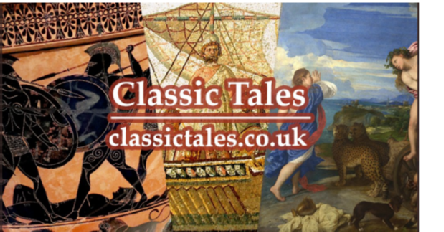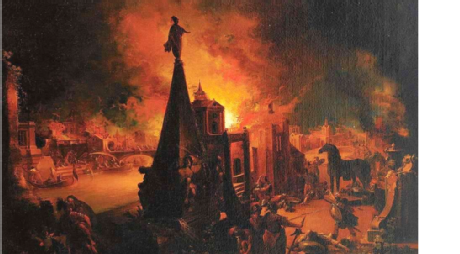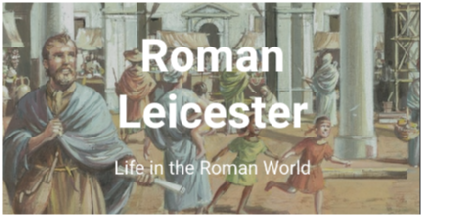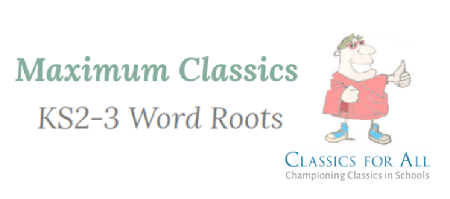KS3 Resources



 The following sites and resources are recommended by Classics for All. You will find links to resources which will help you introduce Classics and Ancient History as well as Latin and Ancient Greek to your KS2 or KS3 curriculum. For more advice and to find out about how WCN and Classics for All can help your school, please use the website feedback form or contact Dr Paul Grigsby at Paul.Grigsby@Warwick.ac.uk.
The following sites and resources are recommended by Classics for All. You will find links to resources which will help you introduce Classics and Ancient History as well as Latin and Ancient Greek to your KS2 or KS3 curriculum. For more advice and to find out about how WCN and Classics for All can help your school, please use the website feedback form or contact Dr Paul Grigsby at Paul.Grigsby@Warwick.ac.uk.
Classics for All, along with their Bristol and South West Classics Hub and the University of Bristol have created a fantastic resource for KS3 combining both knowledge in Classics and Science.
The Science of Stories project invites teachers and pupils to use a selection of ancient classical myths as a way to ignite curiosity, develop ‘science capital,’ and deepen understanding of key scientific concepts. Students are encouraged to engage with the science through storytelling, practical demonstrations, abstract thinking, debate, and creative exercises. They are aimed at KS3 pupils studying the National Curriculum for Science, but some activities are also suitable for pupils at KS2 and GCSE.
Please download, copy, and use these resources in classrooms and extra-curricular clubs freely. If you want to adapt them in any way, or if you require an official license, please contact classics-hub@bristol.ac.uk. Click here to download the Science of Stories Resource Booklet (PDF)
Leicester is one of the most excavated cities in Britain, giving us an exceptional insight into what life was like in the city in the past. This website draws on that incredible resource of archaeological information and the research of the School of Archaeology and Ancient History (University of Leicester). It provides a wealth of information and resources for students, teachers and everyone with an interest in life in the Roman world. Archaeology and Classics in the Community is a unique collaboration between the School of Archaeology and Ancient History, the University of Leicester Archaeological Services and Classics for All.
The benefits of a bit of etymology on pupil's vocabulary and understanding are well documented - think Alex Quigley's Closing the Vocabulary Gap.
Indeed, learning about the roots of the English language offers a key to understanding novel words and enriching vocabulary. The downloads on the site explore Latin and Greek roots that feature frequently in English. Each file consists of a stimulus poster and five worksheets themed around etymologically-linked vocabulary
An amazing 6-week course on Homer's Odyssey created by our sister hub Classics for All in the North, designed to accompany the KS3 English curriculum. This consists of PowerPoints, handouts, activities, homework, assessments and much more.
Peter Wright from Blackpool Sixth Form College, Anna McOmish from Aldridge School, and Alastair Thorley from Stockport Grammar have created a suite of resources on topics from the ancient world.
These downloadable resources can be used for home-schooling, enrichment sessions, or improving general background knowledge. Ideally they can be downloaded and used by teachers at KS3 as full courses in their own right, or can be used to supplement knowledge at GCSE and beyond.
 Hidden Histories
Hidden Histories
Discover the Hidden Histories of the ancient world. These learning resources are designed to introduce diverse topics to Key Stage 3 pupils that cover issues such as gender roles, disability and historic slavery in the context of ancient life.
Created by University of Warwick students Leigh Mencarini, Elizabeth Hayes, Katie Tipple and Georgia-May Brown as part of the module Public Engagement in Classics
AIE resources illustrate the relevance of ancient Athenian inscriptions, especially those of the classical period (the fifth and fourth centuries BC, c. 500-300 BC), to pre-18 education in the UK and beyond. They aim to support teachers who wish to introduce inscriptions into their teaching as a way of captivating their students’ imagination and fostering enthusiasm for the ancient Greek world.
These resources, consisting of teachers’ notes and slides for classes, underline the textual and visual potential of inscriptions for those engaged with learning about ancient Greek history and civilisation. The idea of an inscription being carved and read “in real life” is a way of fostering the curiosity of students about the past. Accordingly, through inscriptions, learners benefit from the bringing to life of the ancient world, perhaps in a way that helps it seem less abstract and initially less complicated. At the same time, they hope that introducing students at pre-18 level to inscriptions will encourage them to explore ancient source material of their own accord, and will help them to ‘bridge the gap’ into University study if they chose to pursue it. In their Introduction to AIE for TeachersLink opens in a new window resource you will find more ideas about using inscriptions in the classroom. They also offer a set of slides which introduce learners of all ages to Greek inscriptions: see Introduction to ancient Athenian inscriptionsLink opens in a new window.
 De Romanis is the new Latin course that you have long been waiting for (or so say Bloomsbury!).
De Romanis is the new Latin course that you have long been waiting for (or so say Bloomsbury!).
An introduction to both the Latin language and the cultural world of the Romans, it also develops English literacy skills through derivation tasks and two-way translation exercises, which promote the understanding of English as well as Latin. Cultural topics, supported by background notes, and primary sources, included for study and analysis, enable students to engage with authentic Roman history and acquire a broad understanding on which to build in future study.
Check out the website for resources and more information.
 It’s the spring of 64 AD, and as dawn breaks over the Subura in Rome, a young woman calls from high in a tenement block to her aunt working in a bar below. While her father collects the rent from the other tenants, a falling tile narrowly misses a senator’s son passing through the streets in a litter. Was it an accident? In the Subura, your life hangs by a thread.
It’s the spring of 64 AD, and as dawn breaks over the Subura in Rome, a young woman calls from high in a tenement block to her aunt working in a bar below. While her father collects the rent from the other tenants, a falling tile narrowly misses a senator’s son passing through the streets in a litter. Was it an accident? In the Subura, your life hangs by a thread.
In a few months Rome, heart of an empire, will burn....
Check out the website for more information on Hands Up's Suburani Latin course and for additional resources.
 Welcome to the Cambridge Latin Course!
Welcome to the Cambridge Latin Course!
With a 50 year history of development and revision, the Cambridge Latin Course (CLC) has established itself as the leading beginner's course for Latin. In addition, both Eduqas and OCR examination boards endorse the Cambridge Latin Course for GCSE teaching.
Aims of the CLC: to teach comprehension of the Latin language for reading purposes; to develop an understanding of the history and culture of Roman civilisation; to encourage a wide range of approaches to language learning through the use of high quality audio-visual resources.
Visit the website for more informational and additional resources.
 The East Midlands Association of Classical Teachers exists primarily to connect teachers of Classical subjects (Greek, Latin, Classical Civilisation, Ancient History) throughout the East Midlands with each other.
The East Midlands Association of Classical Teachers exists primarily to connect teachers of Classical subjects (Greek, Latin, Classical Civilisation, Ancient History) throughout the East Midlands with each other.
Our members are present in both the maintained and independent sectors and our aim is to support the teaching of Classics at any level, from primary education to A levels, as well as helping to prepare students for higher education by our links with local universities and the local branch of the Classical Association.
Follow the links to access online resources from EMACT.
 History Association: an Introduction to Ancient Greek Religion Podcasts + accompanying scheme of work - provides an introduction to some of the key rituals of Ancient Greek religion. The podcasts are for advanced KS2, and KS3 students; Year 13 students (ancient languages) have also successfully used them for background, and they may be helpful in preparation for OCR A Level Classical Civilisation (H408/31) Greek Religion. The scheme of work is aimed at advanced KS2, and KS3 students.
History Association: an Introduction to Ancient Greek Religion Podcasts + accompanying scheme of work - provides an introduction to some of the key rituals of Ancient Greek religion. The podcasts are for advanced KS2, and KS3 students; Year 13 students (ancient languages) have also successfully used them for background, and they may be helpful in preparation for OCR A Level Classical Civilisation (H408/31) Greek Religion. The scheme of work is aimed at advanced KS2, and KS3 students.
The podcasts are narrated by Simon Brown and written by: Hugh Bowden (King’s College, London), Felix Budelmann (University of Oxford), Esther Eidinow (University of Bristol), Olympia Panagiotidou (University of Thessaloniki), Robert Parker (University of Oxford), and Yulia Ustinova (Ben Gurion University, Israel).
BBC Bitesize is an excellent free resource with great activities and video clips on a range of topics, including Prehistoric Britain; Roman Britain; Ancient Greece; Indus Valley; Roman Empire; Shang Dynasty; Ancient Egypt; Understanding evidence. Click on the pictures below to go to each site.
 The Faculty of Education at the University of Cambridge have created this suite of free downloadable audio files and teaching resources produced by award-winning storytellers Daniel Morden and Hugh Lupton, suitable for both KS2 and KS3. Tales include Aesop's Fables; Tales of Metamorphoses; The War With Troy; The Return From Troy
The Faculty of Education at the University of Cambridge have created this suite of free downloadable audio files and teaching resources produced by award-winning storytellers Daniel Morden and Hugh Lupton, suitable for both KS2 and KS3. Tales include Aesop's Fables; Tales of Metamorphoses; The War With Troy; The Return From Troy
Includes Lesson Plans.
 Priam, Ancient History Resourcesis a growing collection of resources about the ancient world. Texts, online magazines, databases, tools and communities are complemented by a section of highlights and a gallery with images from and about antiquity.
Priam, Ancient History Resourcesis a growing collection of resources about the ancient world. Texts, online magazines, databases, tools and communities are complemented by a section of highlights and a gallery with images from and about antiquity.
Whether you are new to ancient history, seeking to deepen your knowledge or are an experienced ancient historian, there is plenty of material on Priam for you to explore.
Resources are categorised by level: 'starting out', 'building on my knowledge', 'advanced/expert'. Especially useful to teachers, students, graduates, researchers, writers and history enthusiasts.








